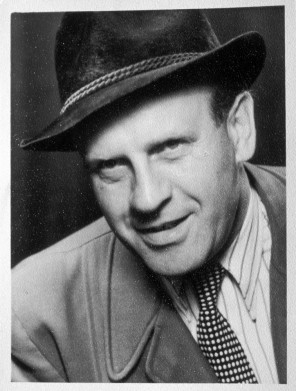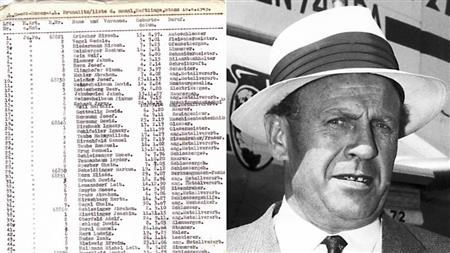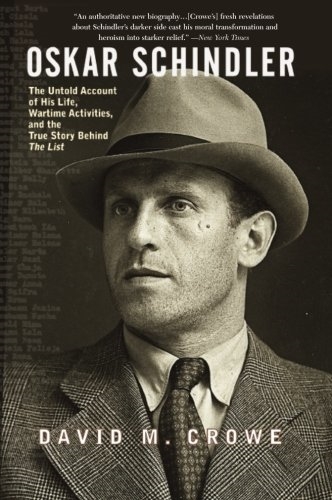 |
| (epochaplus.cz ()) |
"Shortly after his fifty-fourth birthday in 1962, Schindler was officially declared a "Righteous Gentile" and invited to plant a tree on the Avenue of the Righteous leading up to Jerusalem's Yad Vashem Museum, a memorial to the Holocaust"("Oskar Schindler.") Oskar Schindler was born in 1908 in Zwittau, Moravia. After the Nazi party gained power in Germany, Schindler joined the German bandwagon and allied himself with the Nazis. When Schindler heard about the opportunity for business and cheap labor he moved to Krakow in order to set up a profitable business. Through his charm and charisma he got well connected with high ranking Nazi officials and soon became very famous among the Nazi party. However, Schindler did not care for the same goals as the Nazis, but instead he looked for good business opportunity from the war. When Schindler got hold of a factory in Krakow he started hiring Jews for cheap labor. As the war progressed Schindler grew more fond of his workers. When the Nazis began hauling Jews off to the death camps, he decided to do something about these acts of terror. He would recruit Jews to work at his factory where they could avoid certain death and mistreatment. Oskar Schindler showed heroism through his willingness to sacrifice himself for the lives of others and the courage to see through the Nazi propaganda to then take a stand against it.
Schindler showed the world that he had the potential to sacrifice everything he had achieved in his earlier years to save the lives of those who so desperately needed to be saved. Schindler used his wealth and power to pull strings to get the results he required for his plan. "female workers and a number of children had been sent to Auschwitz. Schindler bribed officials with a bag of diamonds to have these people returned to him. He insisted that he needed the children because their small fingers were better at polishing the bomb parts that the new factory was to produce"("Oskar Schindler.") Schindler sacrificed his own wealth to save the lives of those that were looked down on by the people of the time. Schindler did not care for the beliefs of the society and instead did everything in his power to save those that he believed were being mistreated. He not only sacrificed his wealth but also his life, because if the Nazis found out about his plan he would have been imprisoned as a traitor. Schindler also showed that he was capable of making sacrifices through the businesses he was running. "Over the next seven months, Schindler's factory never produced a single useful shell (the outer casings for bullets). He called it "start-up difficulties" when, in reality, he had purposefully weakened the manufacturing process to make sure that the shells failed quality-control tests"("Oskar Schindler Biography.") He used his entire life's profit to save those that would have otherwise been doomed to certain death. Many others would never have done this even if given the chance. Schindler however, could see that the materialistic things that he was so fond of could save something much more valuable. Schindler's ability to do what many others could not and sacrifice his own comfort to save the lives of those he knew were otherwise doomed makes him a hero.
 |
| (abcnews.go.com ()) |
Schindler's sacrifices were not the only qualities of heroism that he possessed, his courage to see past the Nazi beliefs and to take a stand to protect those who needed protection. Schindler would use bribes and his charisma to convince Nazi officials to do his bidding."Schindler raced to the station and argued with Nazi officers about how essential his workers were to the war effort. By dropping the names of some of his Nazi friends and making a couple of threats, he was finally able to rescue the workers and escort them safely back to his factory"("Oskar Schindler") If Schindler was caught for bribery or working to the benefit of Jews he would have been imprisoned. However he would threaten Nazis to keep those he had grown to care for safe. His courage to stand up to those that mistreated others was beyond heroic as only one strand of the web he was weaving needed to be cut, in order for his whole plan to come crashing down. Schindler's courage was also reflected when he signed the famous Schindler's list that contained all the names of those he would recruit to his safe haven."Schindler and his associates drew up a list of names of the workers who would be needed at the new plant. Having one's name on the list meant that you would live. On the list were the names of more than 1,000 Jews who lived and worked at either the enamel factory or the Plaszow work camps"("Oskar Schindler.") Schindler knew that when he put his name on the list, that if anything went wrong he would suffer at the cost of his life. He however, had the courage to take these risks knowing that for every name on the list a new generation would be born. Schindler's courage allowed him to accomplish something that others could only dream of. For Schindler it was more than heroics, he meant to save those he had grown to respect and love.
 |
| (www.amazon.com ()) |
Works Cited
Crowe, David. "Oskar Schindler." Encyclopaedia Judaica. Ed. Michael Berenbaum and
Fred Skolnik. 2nd ed. Detroit: Macmillan Reference USA, 2007. Biography in Context. Web. 29 Jan. 2016.
"Oskar Schindler Biography." - Life, Family, Childhood, Children, Name, Story,
Death,Wife, School. N.p., n.d. Web. 02 Feb. 2016.
/www.notablebiographies.com/Ro-Sc/Schindler-Oskar.html>.
"Oskar Schindler." Contemporary Heroes and Heroines. Vol. 3. Detroit: Gale, 1998.
Biography in Context. Web. 3 Feb. 2016.
"Oskar Schindler." Merriam Webster's Biographical Dictionary. Springfield, MA:
Merriam-Webster, 1995.Biography in Context. Web. 29 Jan. 2016
"Oskar Schindler." People of the Holocaust. Gale, 1998. Biography in Context. Web. 29
Jan. 2016.
"The Oscar Schindler Story." The Oscar Schindler Story. N.p., n.d. Web. 12 Feb. 2016.
Page created on 2/15/2016 12:00:00 AM
Last edited 2/15/2016 12:00:00 AM
